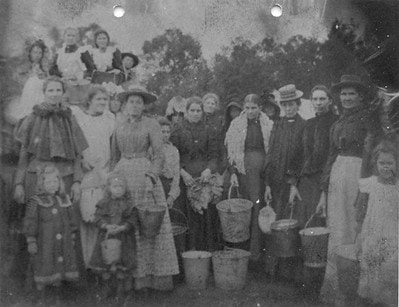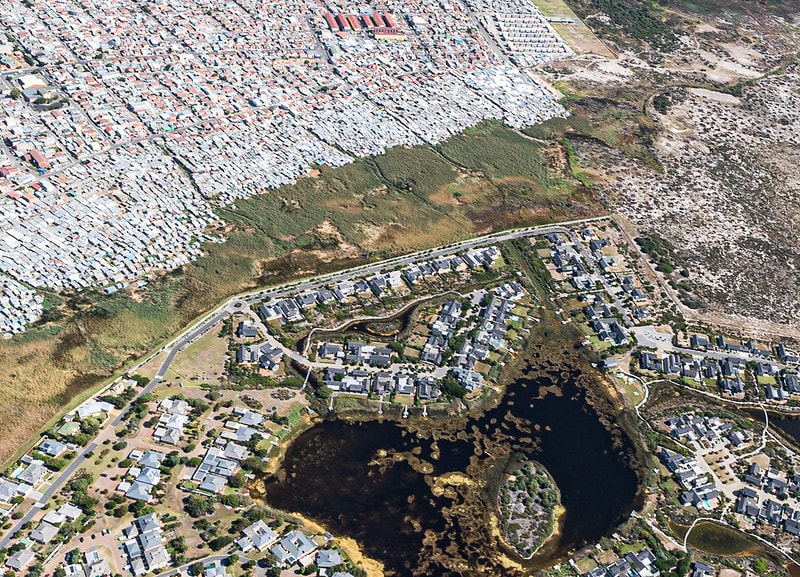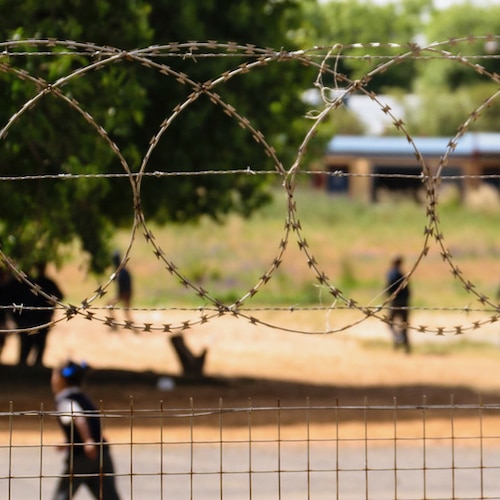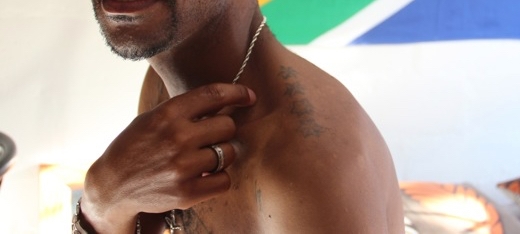Part 1: 1921
“Poison Tea, Colonial Imports”, by an Observer
“Them nasty Malays can make it work
months after you take it”, quotes Lady Duff G.:
This, Cape’s white servants had said of the punks.
So, Mr ‘Malay doctor’ downs his tea
Then walks away: indignity. To his
spiced plates of Europe-Asia-Africa:
And, “exotic!” they’ll say, one day, of this…
Forget spice was brought by the trafficker.
The Cape’s shining sea collects the city’s
tears.
bredie, breyani, bobtie, sosaties.
broken, breaking, tied up, massacred slaves.
The Cape’s shining sea collects the city’s
tears. Mr ‘Malay doctor’ salts his soup, grave.
In his home built on the bones of black and
brown flesh. Calm, Lady G. walks in the sand.

Part 2: 1930s
“Expulsion to the City”, by a White Farmer
Sweet Earth — pure — how tender did you spring forth
grains for my chakalaka and pap, herb
for my aching knees, tobacco for my
hot pipe.
My Earth. My hearth. Thankful for my birth here
in the hills of my bountiful Cape. Here, I was God:
Yellow sugar and yellow grains turned gold
Once they’d run the rounds of the ocean deep.
But alas — as you sense it — I must mourn you.
Earth!, I now come
to announce to you my death. At the hands
of the machine. To the gold which runs from
mines and manufacture.
From where I was God, this churning Modernity comes to expel me
beyond my historic land. To the city,
Where nothing shall grow as verdant and blushed as your fruits and bountiful leaves.
Modernity screams to our white race — pure as sea-froth
and white daisies —
that we must, need, shed ourselves of our
rurality.
As we entomb ourselves:
to become men of the city.
Fret not! We will leave our tender, civilised women to
guard you, sweet Earth. As we entomb ourselves:
to become men of the city. We go…
…’gainst Afrikaner female and black man
We had to fight, sweet sunshine Earth, to live
deservedly, akin to as the Gods we once were. Mixed close to
the coloureds who have taken your sweet, fragrant
tan, but nothing of the demeanour, I
am caught up in vying — as I search for new golds — for my
separation from this delinquent kind.
As I bury that part of me which longs for you, I report that there is hope yet, Earth.
Our protectors in Cape Town welcome our
rural, sun-blushed poverty.
Our protectors in Cape Town are set hard and fast against the decay
wrought by the criminal, drugged, slovenly native,
that your protector — sweet Sun — was right to burn for their sinning.

Part 3a: 1980s
“The Criminal Element 1”, by Michael-Welcome
According to the ANC, I am candy ripe for the plucking.
Yet, I’m the poison kind which will slit their throat as I go down.
We were stuck up high-rise style on the Cape Flats in the 60s. Because white man didn’t want to touch us.
Body a battleground. Body forced to the township. Body stabbed at 14. Body must be protected. So I kill.
Dark inky stars needled into my skin are my trophies.
Murdering puts me behind bars. From the Junior Young Ones I am upgraded to the 28s. Dark inky stars needled into my skin are my trophies. At 19 I stabbed a prison warder to death: illuminating my skin for the first time: One-Star General. I force 2,500 inmates to sit and stand as I please, when I want to, if I want to, because I can.
I was warned that I will leave this place bloodied and cold unless I learn to survive. I make 500,000 Rand a month on prostitution, extortion, and protection.
I feel no pain.
Part 3b: 1990s
“The Criminal Element 2”, by Michael-Welcome
Serote said: “AND
Once upon a time, I was top achiever in Spes Bona high school, in Athlone, Cape Town, where I would one day leave so many dead: dead as the men whose spirits were doomed to reside in my ripped textbooks.
I felt death’s pain only when I imagined my daughter unborn.
It was my Colonel’s laughter which unleashed the imagining.
Ill, I conjured her into the woman he had murdered, the woman he had raped, the woman whose house he had emptied. He stood before me in Pollsmoor Prison. Not far from the same Cape Town in whose streets we’d left bodies littered as we ran, pushing drugs, ruthless.
The same bloody spirit of survival we’d brought inside these walls, literate in knife and death, and drink. To survive was simply to harden yourself exponentially until death, unless some strange path led you otherwise.
A little brown girl running in the grass outside somewhere — un-barred — laughing like my Colonel, here, marked that path. Through her, I unlearnt my pride, as I began to imagine death as disease. This girl whose life should be spotless, who I’d call my own:
Could I — will I — be proud if she brings home a man like me, if she grows into a woman like the bloody man I am? If she dreams of stars like the ones etched into my chest, salivating after them, as I had in my youth, as alcohol burnt away any sense of conscience as I chased after them, lauded my fierceness, thanking my own daddy and grandaddy for their example,
which was keeping me alive when nobody else would.
To survive was simply to harden yourself exponentially until death.
I thought of my mother swinging her iron into my head when she was angry, again and again, bled dry of coin or help, she helped me feel criminal when I cried alone in a high-rise flat,
she alone, my daddy long gone. My parents were the dangerous tropes whose origin was not their dead hearts, but that push-out in the 60s, the visions by others of their abhorrence. Chased down by the State.
Today, too, I hear women having their maintenance grant taken by state: ‘phased out’. They’re told to come inform on us to police and government.
I imagine my iron-swinging momma doing that to my father. She wants him away, but she doesn’t want him gone.
When the new Century comes, I want a little girl. Born of me.
But born of a new time.
Of innocence, divorced of history.
I used to like history.
Once upon a time, I was top achiever in Spes Bona high school, in Athlone, in Cape Town, where I have left so many dead, dead as the men whose spirits were doomed to reside in my ripped-up textbooks.
I make an appeal to the 28s to let me walk free from the gang. I’m naked and two men stand behind me with sharpened sticks ready to kill me if I should fail.
“…children in prison [are] highly traumatised, mentally unstable, and depressed by the environment.”
Part 4: Present
“Cockroaches (after Kafka)”, by Narrator
Police Man 1 woke up one morning from unsettling dreams: his daughter had found herself walking down a road in Lavender Hill.
Of course, she had been snatched from the pavement, by one black and one coloured man who were both quite ready to kill
her.
And whom, somewhere deep inside, he knew he was quite ready to kill, too.
Thankfully, he could hear that his daughter was downstairs, screaming delightfully. Far away from the hotbeds of those who chose callous, calculated violence each day. He was safe, behind hard gates. Locked windows. Patrolled peripheries. Far from all the cockroaches (as he’d told the Danish guy, Jensen) of the real-not-dreamed-of Lavender Hill.
Plastered all over his grotesque exoskeleton were the official logos of the gun he carried.
Shaken, he reached out to switch off the alarm which had roused him awake. Feeling strange, “what’s happened to me?”, he thought. He looked down, and found himself changed into a monstrous vermin.
Plastered all over his grotesque exoskeleton were the official logos of the gun he carried, and that of the SAPS.
***
Somewhere in Lavender Hill, at a similar time to Police Man 1, the gang leader of the Junior Young Ones awoke flailing too-short too-thin legs. His tattoos were still faintly visible on his new, hard exoskeleton. As he looked down on his new ribcage, he saw the logos of the guns he’d stolen amidst the folds.
***
Narrator: Confined to their respective houses, they realise they are tools of the state, “without brains or backbone”, or, a capacity for nuance.

Part 5: Present
“Poet”, by Anonymous
“Here is a 3-bedroom double storey home nestled in a safe gated community in Wetton”, ZAR 1,099,000.
Does the “poet” write from behind bars of a different sort to Michael-Welcome’s? If she does, should we pay heed to any word at all that she has written? Is her work at all worthy? If so, of what?
Explanatory Appendix
This experimental poem is a rethinking of Steffen Jensen’s article “The security and development nexus in Cape Town: War on gangs, counterinsurgency and citizenship”, Security Dialogue, 41(1): 77-97. This traces the historical development of gang violence in Cape Town through time, deftly examining how, after the end of apartheid in 1994, the “problem” of impoverished and crime-ridden townships shifted – in the view of the state – from deserving a development-orientated solution to calling for an intensified securitization approach instead. This shift precipitated the emergence of a counterproductive binary whereby township citizens were either conceived as idealised victims of crime, or, “the embodiment of all evil” (Jensen, 2010: 83). In turn, this meant that the complexities of township life were reduced in such a way that entire geographical swathes and their inhabitants became criminalised. Due to this binary, and the concurrent myopic focus on security, the state has been exonerated from taking charge of its citizens’ welfare. Whilst the state pursues security measures, urban development projects in the city remain underfunded and the poor suffer enduring impoverishment.
Due to this binary, and the concurrent myopic focus on security, the state has been exonerated from taking charge of its citizens’ welfare.
Whilst Jensen’s study is powerful and thought-provoking, his article is nonetheless marked by a sparse inclusion of the voices of those citizens (“evil” or idealised) that he speaks of, and – necessarily, due to the short nature of the article form – it also does not deal with the long(er) history of violence and inequality within which the current gang dynamics that he deals with inscribe themselves. In response to this, my experimental poetic piece seeks to, firstly, meditate on individual voices, moreover in a way that explicitly contextualises them within a deep history. What I have sought to do is create a piece that counters the binaries which Jensen has highlighted as problematic and damaging for governance in Cape Town by voicing the messy, nuanced human. I do so in a manner that mirrors the chronological structure of Jensen’s article, offering different voices from different time periods, whilst highlighting the complex historical racial problematics that underpin the complex development of gang-related security and development practices in present day Cape Town.
In terms of style, I have purposefully chosen to write different parts of my experimental poem in different ways. Part 1 examines 1920s Cape Town through the colonial form of the sonnet, to centre the damaging racism and complex tensions of Cape Town’s origins whilst also attempting to decolonise this particular poetic form. Part 2 considers the origins of apartheid through a romantic pastoral elegy, examining the rural-urban dynamics of exclusion in Cape Town in a purposefully sycophantic tone seeking to highlight the absurdity of race politics that underpin the historic citizenship differentiation from the perspective of a white settler. Parts 3a and 3b draw on the real-life testimonies of former South African gang members to examine the cold-bloodedness of gang warfare in Cape Town, but also, the deeper roots which lead to gang violence, as well as the possibilities of redemption. Part 4 explores the absurdity of the entrenched binaries that Jensen highlights by paying homage to Franz Kafka’s 1915 novel The Metamorphosis, while drawing inspiration from a news item about the particular circulation of guns in South Africa. Part 5 brings the poem to a close by encouraging the reader to critically consider whether, I, as “poet” had any right to, or purchase on, the topics examined.
The latter was particularly important to me, because if any fictional approach is to (perhaps ambitiously) have a “positive” effect on the lives of those it approaches, we must avoid reducing or elevating authors or poets to being omniscient and irreproachable. So, whilst harmful binaries are in need of deconstruction – something my poem seeks to tackle – I must end by asking…
If any fictional approach is to [… ] have a “positive” effect [… ], we must avoid reducing or elevating authors or poets to being omniscient and irreproachable.
So, the “poet” writes from behind a MacBook in a “Development” Institute somewhere in Geneva. She had the luxury to visit South Africa once as a “tourist”. She is “mixed-race”. Herself, messy. Should we pay heed to any word at all that she has written? Is her work at all worthy? If so, of what? Personally, I am not convinced my work is of any earth-shattering kind, but if it has sparked some thought a little more colourful than the predominant one in black and white in someone, somewhere, then, perhaps, it is just alright that it has been published here after all…
Images:
Featured Image: Barbed razor wire around a school, near Cape Town – Photo (Cropped – CC BY 2.0 ) by DJM Photos, Flickr.
The sea as memory of slavery – Image by Erik Mclean on Unsplash.
Afrikaners /Boers farmers circa 1900- Image (CC BY-NC-SA 2.0) by Colin Daniels (Flickr).
Capetown: the logic of apartheid still visible in its urban planning – Image (CC BY-NC-SA 2.0) by Eugene Kapersky (Flickr).
Star Tattoos: Image (Cropped – CC BY 2.0) by Lindsay Mgbor/Department for International Development, on Wikimedia.





